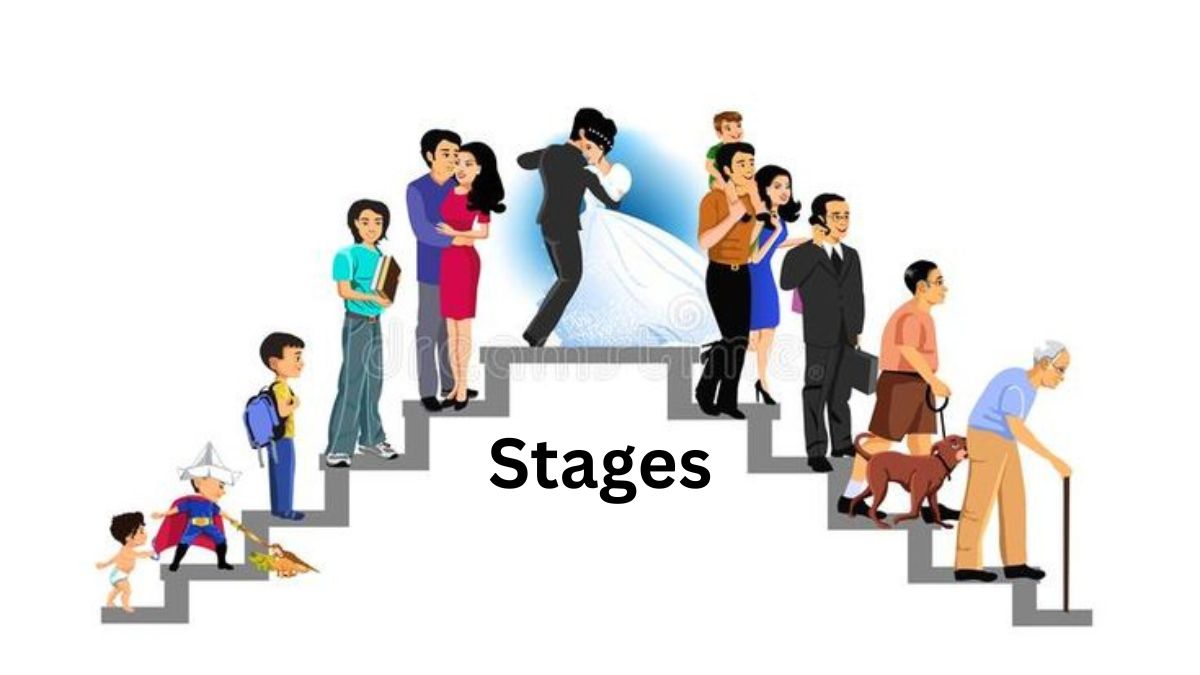Embarking on the journey of life is like setting sail on a vast ocean, encountering different landscapes and weather conditions along the way. Just as a sailor must navigate through various stages of their voyage, we too must navigate through the distinct stages of life. Understanding these stages not only provides insight into our own growth but also helps us appreciate the unique experiences that shape who we are. Join me as we embark on a voyage through the four main stages of life and explore how each one contributes to the tapestry of our existence.
A. Explanation of why understanding life stages is important
Have you ever stopped to ponder the significance of understanding the various stages of life? It’s like unraveling a complex tapestry that weaves together our experiences, emotions, and growth. By grasping the distinct characteristics and milestones of each stage, we gain valuable insights into human development.
Understanding life stages provides us with a roadmap for navigating challenges and transitions effectively. From childhood innocence to adolescent turmoil, adulthood responsibilities, and finally the elderly years filled with wisdom – each phase offers its unique set of lessons and opportunities for personal evolution.
Embracing these different stages allows us to appreciate the beauty in every age group – fostering empathy, compassion, and a deeper connection with others on their journeys through life. So let’s embark on this enlightening exploration together as we delve into the intricate tapestry of human existence.
The Four Main Stages of Life
Life is a journey that unfolds in distinct stages, each with its own set of challenges and triumphs. Childhood marks the beginning of this odyssey, characterized by innocence, curiosity, and rapid growth. From learning to walk to forming foundational relationships, these early years shape our future selves.
Adolescence emerges like a whirlwind, bringing hormonal changes, peer pressure, and self-discovery. Navigating through this period involves finding one’s identity amidst societal expectations and personal aspirations. It’s a time of rebellion and introspection as individuals strive to carve out their unique paths.
Entering adulthood signifies taking on responsibilities such as careers, relationships, and financial independence. This stage often entails juggling multiple roles while pursuing personal goals and ambitions. Accomplishments are celebrated alongside inevitable setbacks which serve as valuable lessons for personal growth.
The elderly years present new challenges related to health issues and reflections on a life well-lived. Maintaining physical well-being becomes paramount as individuals reflect on their legacies while cherishing moments with loved ones. Transitioning through these stages shapes us into resilient beings ready to embrace what lies ahead in the journey of life.
A. Childhood
Childhood is a magical time filled with wonder and innocence. It’s a stage where curiosity knows no bounds, and every experience is an adventure waiting to unfold.
During childhood, milestones like learning to walk, talk, and make friends mark the journey of growth. The world is seen through eyes untainted by cynicism or doubt, where imagination reigns supreme.
It’s a time of carefree laughter, scraped knees from endless playtime adventures, and the comfort of knowing that there’s always someone looking out for you. Childhood shapes our foundation – molding our beliefs, values, and sense of self.
As we navigate this stage with wide-eyed wonderment, we begin to understand the building blocks that will pave the way for future stages in life. Childhood lays the groundwork for who we are to become – it’s a precious chapter in our story that deserves to be cherished and nurtured with love and guidance.
I. Characteristics and milestones
Childhood is a magical time filled with innocence and wonder. It’s a stage where imagination runs wild, and the world is seen through curious eyes. Characteristics of childhood often include boundless energy, endless curiosity, and an eagerness to learn about everything around them.
Milestones in this stage can vary from first steps to learning how to ride a bike or even making their first friends. These moments shape their view of the world and help form the foundation for future growth. Childhood milestones are not just physical achievements but also emotional and cognitive developments that set the stage for adolescence and beyond.
As children navigate this stage, they begin to form their identities, develop social skills, and learn essential life lessons. Each child’s journey through childhood is unique, with experiences that mold them into who they will become in adulthood. It’s a time of exploration, playfulness, and discovery that lays the groundwork for their future endeavors.
B. Adolescence
Ah, adolescence – a time of transformation and self-discovery. This stage marks the transition from childhood to adulthood, filled with both challenges and changes that shape our identities. The teenage years are often characterized by heightened emotions, peer influence, and a search for independence. It’s a period where individuals start to form their own beliefs, values, and goals separate from their family.
Adolescents grapple with issues such as identity formation, social pressures, academic stress, and physical changes. This phase can be tumultuous as young people navigate the complexities of relationships while trying to establish their place in the world. It’s a time of exploration – trying new things, making mistakes, learning valuable lessons along the way.
As adolescents strive for autonomy and seek acceptance from peers, they may experience feelings of insecurity and self-doubt. The journey through adolescence is not always smooth sailing; it’s about finding balance between independence and guidance from trusted adults or mentors. Each individual’s experience during this stage is unique but universal in its essence – a rite of passage towards maturity and self-awareness.
I. Challenges and changes
Navigating the turbulent waters of adolescence can often feel like riding a rollercoaster with unexpected twists and turns. During this stage of life, challenges and changes become constant companions, shaping our identity in profound ways. The journey from childhood to adulthood is marked by a whirlwind of emotions, physical transformations, and newfound responsibilities.
As teenagers strive for independence and self-discovery, they are faced with the pressure to fit in while also standing out. Peer relationships take center stage as social dynamics evolve, influencing beliefs and behaviors. Moreover, hormonal fluctuations can lead to mood swings that further complicate an already complex period.
The quest for autonomy clashes with parental expectations, creating tension within familial bonds. As adolescents grapple with their evolving sense of self, they are confronted with decisions that carry long-term consequences. Navigating these challenges requires resilience, adaptability, and a willingness to embrace change as an inevitable part of growth.
C. Adulthood
Entering adulthood is a pivotal stage in life, marked by taking on increased responsibilities and forging one’s path. This phase brings a mix of excitement and challenges as individuals navigate building careers, relationships, and establishing their identity. Adulthood is where dreams meet reality, requiring perseverance to achieve goals amidst the complexities of adulting.
In this stage, many experience significant milestones such as starting a family, buying a home, or advancing in their careers. The pressure to succeed can be intense but also rewarding when accomplishments are achieved through hard work and dedication.
Adulthood demands decision-making skills sharpened by experiences gained over time. It’s a period for personal growth and self-discovery where choices made shape future outcomes. Handling finances wisely becomes crucial along with maintaining balance between work and personal life.
As adults juggle various roles such as being professionals, partners, parents – finding equilibrium becomes vital for overall well-being. Self-care practices like prioritizing mental health are essential during this demanding yet fulfilling chapter of life.
I. Responsibilities and accomplishments
Entering adulthood brings a wave of responsibilities that shape our daily lives. From managing finances to building a career, the journey is filled with challenges and accomplishments. Each milestone achieved adds another layer to our growth and development.
Taking on responsibilities like paying bills, maintaining relationships, and pursuing personal goals become integral parts of adult life. It’s a period where decisions carry more weight, influencing our future paths significantly.
Accomplishments in adulthood vary from person to person but are equally valuable in defining success. Whether it’s landing a dream job, starting a family, or achieving personal milestones, each achievement contributes to our sense of fulfillment.
Balancing responsibilities and celebrating achievements create a dynamic cycle that propels us forward into new opportunities and experiences. Embracing the journey with open arms leads to continuous growth and self-discovery throughout the adult stage of life.
D. Elderly Years
As we gracefully embrace the elderly years, a new chapter unfolds before us. This stage is characterized by wisdom gained through a lifetime of experiences and lessons learned. Health becomes a focal point, requiring attention and care to maintain well-being.
Navigating the challenges that come with aging can be both rewarding and demanding. It’s a time of reflection on past accomplishments and cherished memories while facing the realities of physical limitations.
Maintaining social connections becomes paramount as we seek companionship and support from loved ones. Finding joy in simple pleasures becomes more meaningful than ever before.
Embracing this stage with grace and resilience allows us to appreciate the journey of life in its entirety. Each day presents an opportunity for growth, gratitude, and acceptance of all that has brought us to this moment in time.
I. Health and well-being
As we gracefully enter the elderly years, our focus shifts towards prioritizing health and well-being. This stage often comes with its own set of challenges and adjustments as our bodies undergo natural changes. It becomes essential to pay closer attention to maintaining a healthy lifestyle through regular exercise, proper nutrition, and routine medical check-ups.
Mental health also plays a crucial role during this period as we may face issues like loneliness or loss of independence. Engaging in activities that stimulate the mind and keeping social connections strong can significantly impact overall well-being. Additionally, seeking support from loved ones or professional services can help navigate any emotional hurdles that may arise.
Taking care of ourselves holistically is key to enjoying a fulfilling life in our elderly years. Prioritizing self-care practices such as meditation, hobbies, or relaxation techniques can contribute to a sense of peace and contentment as we embrace this stage full of wisdom and experience.
How Our Experiences Shape Us Throughout Each Stage
As we journey through the various stages of life, our experiences play a fundamental role in shaping who we become. During childhood, every new encounter and lesson learned molds our developing minds and sets the foundation for future growth. The innocence and curiosity of youth pave the way for exploration and self-discovery.
Moving into adolescence, challenges abound as we navigate peer relationships, academic pressures, and personal identity formation. These formative years are marked by highs and lows that leave lasting imprints on our emotional landscape.
Entering adulthood brings a new set of responsibilities and opportunities for personal accomplishment. Whether pursuing higher education, starting a career, or building relationships, each experience contributes to our sense of purpose and fulfillment.
As we transition into the elderly years, reflections on a lifetime of experiences shape how we approach health concerns and overall well-being. Our resilience in facing adversity is often a product of lessons learned throughout each stage of life.
The tapestry woven by our diverse experiences forms a unique narrative that continues to evolve as we move through life’s different chapters.
Navigating Transitions Between Stages
Navigating transitions between stages is a continuous process that shapes our lives. As we move from one stage to another, we carry with us the experiences and lessons learned along the way. Understanding and embracing these changes help us grow and adapt to new challenges.
Each stage of life offers unique opportunities for growth and self-discovery. By recognizing the importance of each stage, we can better appreciate the journey of life in its entirety. Embracing the different stages allows us to fully experience all that life has to offer, from childhood innocence to elderly wisdom.
So, as we navigate through the various stages of life, let’s remember that every transition is an opportunity for personal development and growth. Embrace change, learn from experiences, and continue moving forward on this remarkable journey called life.










